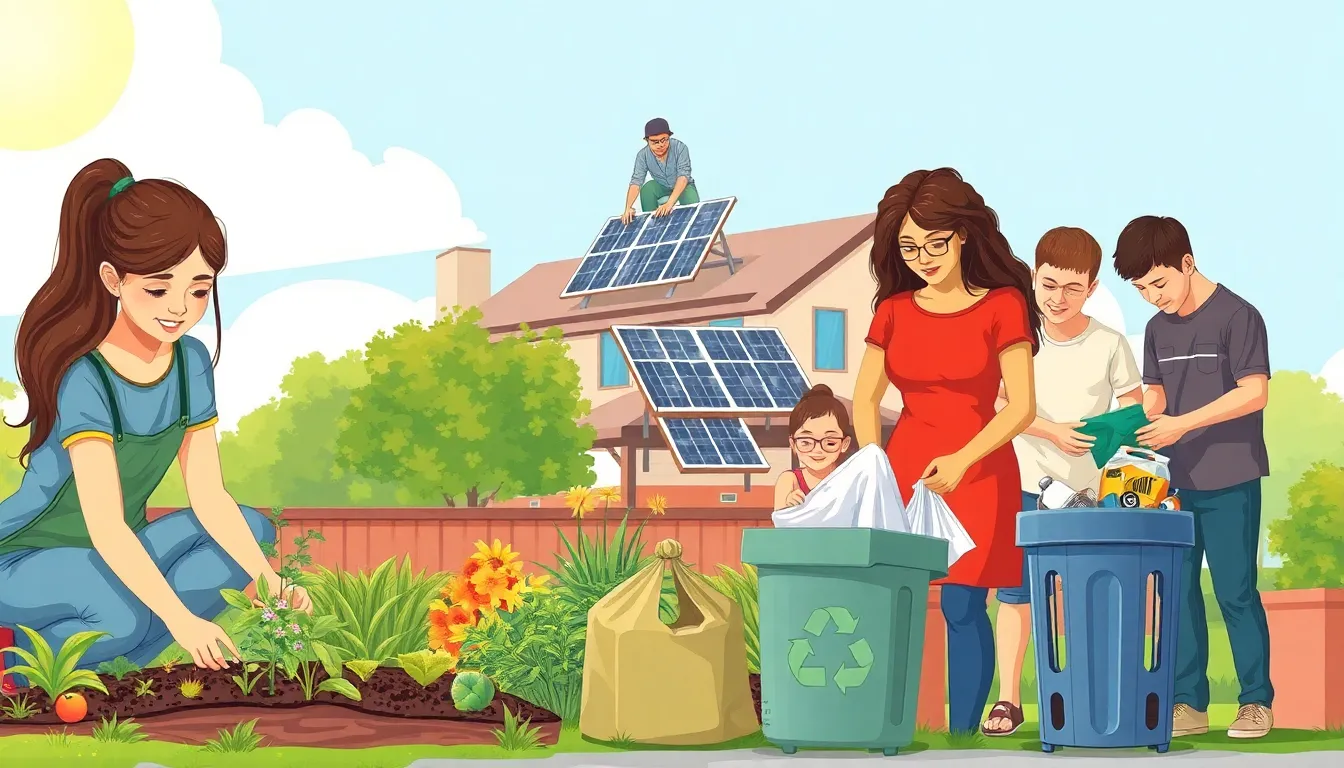In a world where plastic seems to breed like rabbits and carbon footprints are as common as cat videos, sustainable living isn’t just a trend—it’s a necessity. Imagine a life where your choices not only save the planet but also make you the envy of your friends. Who wouldn’t want to be the eco-warrior at the next barbecue, dazzling everyone with tales of composting and solar panels?
Sustainable Living Blog
A sustainable living blog serves as a platform for sharing eco-friendly practices and lifestyles. These blogs focus on reducing environmental impact and promoting sustainable choices. Readers often find tips on minimizing waste, conserving energy, and using renewable resources.
Many sustainable living blogs feature DIY projects that encourage reusing and upcycling materials. They provide recipes for organic meals, emphasizing seasonal and local produce. Some articles may delve into the benefits of a plant-based diet and its positive impact on the planet.
Additionally, sustainable living blogs frequently review eco-friendly products. These products range from biodegradable cleaners to solar-powered appliances. By offering insights on sustainable brands, these blogs support consumers in making informed decisions.
Readers encounter a community of like-minded individuals who share their experiences and successes. Forums and social media links enhance engagement with a broader audience. Sharing successes can inspire others to adopt sustainable practices.
Furthermore, some blogs discuss environmental policies and advocate for change. Highlighting grassroots efforts and encouraging activism raises awareness of critical issues facing the planet.
Overall, sustainable living blogs serve an essential role in promoting an environmentally conscious lifestyle. They remain a vital resource for anyone seeking to make a positive impact on the world.
Key Principles of Sustainable Living

Sustainable living incorporates several key principles that guide eco-friendly practices. Understanding these principles fosters a lifestyle that minimizes environmental impact.
Reduce, Reuse, Recycle
Reducing waste stands at the forefront of sustainable living. Individuals can start by cutting down on single-use plastics and choosing products with minimal packaging. Reusing items, such as glass jars or fabric bags, helps extend the lifecycle of materials. Recycling paper, plastic, and metals enables resources to re-enter the production cycle, conserving energy and raw materials. Communities often provide accessible recycling programs to promote this practice. Adopting these habits creates a culture of sustainability that inspires others to follow suit.
Renewable Energy Sources
Using renewable energy sources significantly decreases reliance on fossil fuels. Solar panels and wind turbines convert natural resources into clean energy, reducing greenhouse gas emissions. Homeowners can install solar systems to harness sunlight, providing a sustainable energy source. Additionally, opting for green energy plans from local utilities supports energy produced from renewables like hydro and geothermal. Transitioning to renewable energy not only minimizes environmental impacts but often results in long-term savings on utility bills.
Sustainable Food Choices
Choosing sustainable food options impacts personal health and the environment. Eating locally sourced produce reduces transportation emissions and supports local farmers. Organic farming methods avoid synthetic pesticides and fertilizers, promoting soil health and biodiversity. Plant-based diets typically require fewer resources than meat-based diets, aligning with sustainability goals. Incorporating seasonal fruits and vegetables encourages a varied, nutritious diet while minimizing ecological footprints. Engaging in community-supported agriculture programs helps individuals access fresh, organic foods while building connections with local growers.
Benefits of Following a Sustainable Living Blog
Following a sustainable living blog offers numerous advantages across various aspects of life. Readers gain insights into eco-friendly practices that significantly lower their environmental impact.
Environmental Impact
Emphasizing sustainable practices directly contributes to a healthier planet. Readers learn about reducing carbon footprints through actionable tips like minimizing waste and opting for renewable energy sources. Engaging with this content fosters awareness of critical environmental issues, including plastic pollution and climate change. Blogs often showcase successful examples of sustainable living, inspiring readers to replicate these efforts in their daily lives. By implementing these strategies, individuals become part of a larger movement toward a more sustainable future.
Cost Savings
Sustainable living can lead to substantial financial savings over time. Following blogs that focus on eco-friendly habits often reveals cost-effective alternatives to traditional products and services. For instance, opting for energy-efficient appliances reduces utility bills while lowering overall energy consumption. Tips for reusing materials and minimizing waste can also prevent unnecessary spending. Planning meals based on seasonal, locally sourced foods typically results in lower grocery bills as well. These cost savings make sustainable choices both economically and environmentally sound.
Health Benefits
Adopting a sustainable lifestyle significantly enhances overall health. Readers of sustainable living blogs discover the myriad benefits of organic and plant-based diets. Consuming fresh, local produce improves nutrition and reduces exposure to harmful chemicals found in some conventional products. Additionally, engaging in outdoor activities inspired by these blogs encourages physical fitness, promoting a healthier lifestyle. Mental well-being often benefits from connecting with nature and practicing mindfulness in sustainable choices. Following these blogs enables individuals to prioritize health while contributing to a better planet.
Tips for Starting Your Own Sustainable Living Blog
Starting a sustainable living blog requires careful planning and engagement with readers who share similar values. Below are essential tips to guide the process.
Choosing a Niche
Select a niche that resonates with personal interests and strengths. For example, a blog could focus on zero waste living, sustainable fashion, or organic gardening. Consider unique angles within these areas to differentiate from existing blogs. Research popular topics and identify gaps in available content. This approach ensures that the blog remains relevant and useful to its audience.
Content Ideas
Generate diverse content ideas to keep readers engaged and informed. Popular options include DIY projects, eco-friendly product reviews, and tips for reducing carbon footprints. Sharing recipes for healthy, plant-based meals often attracts a dedicated following. Discussing recent environmental studies or trends can provide readers with valuable insights. Regularly feature interviews with experts to add authority and variety. Incorporate personal experiences to create a relatable narrative.
Engaging with Your Audience
Engagement fosters a vibrant community around the blog. Respond promptly to comments and messages from readers. Utilize social media platforms to expand reach and encourage discussions about sustainable living. Hosting challenges or campaigns related to eco-friendly practices can motivate readers to participate actively. Regularly solicit feedback on content preferences to ensure alignment with audience interests. Building this connection transforms the blog into a supportive platform for sharing sustainable ideas and lifestyles.
Conclusion
Embracing sustainable living is more than a personal choice; it’s a collective movement towards a healthier planet. By engaging with sustainable living blogs, individuals can access valuable resources and connect with a community dedicated to eco-friendly practices. These platforms empower readers to make informed decisions that benefit both their well-being and the environment.
As the world faces pressing environmental challenges, each small action contributes to a larger impact. Whether it’s adopting a plant-based diet or reducing waste, every effort counts. Sustainable living isn’t just about change; it’s about creating a legacy of care for future generations. By sharing knowledge and experiences, the movement continues to grow, inspiring others to join in the quest for a more sustainable future.

